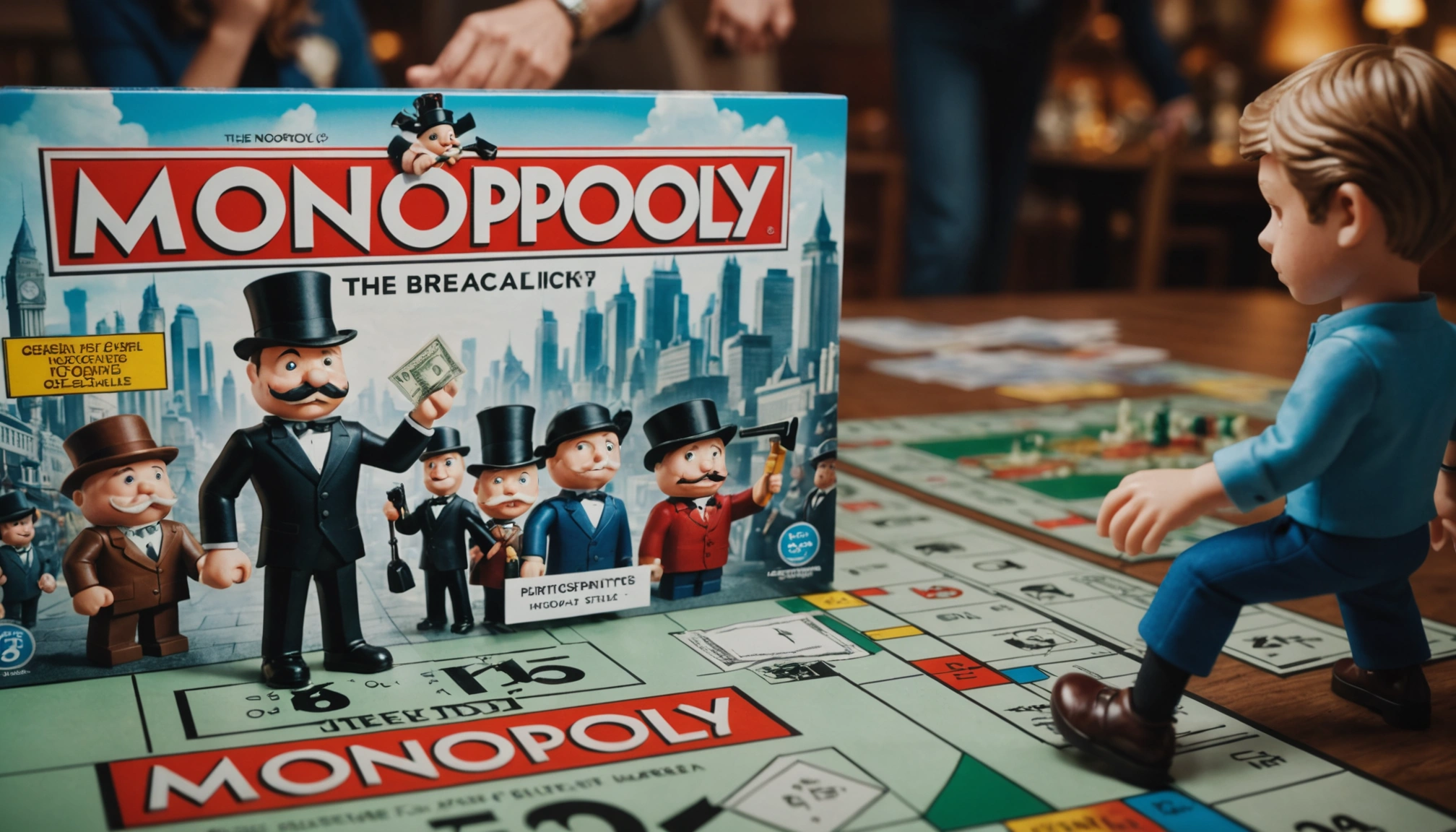The Monopoly Lie: How a Stolen Game Became a Capitalist Icon

The iconic board game Monopoly, a staple in households worldwide, has a history far more complex and controversial than most players realize. While generations have grown up believing Charles Darrow invented the game during the Great Depression, the true story reveals a tale of intellectual theft, corporate maneuvering, and the erasure of a woman named Lizzie Magie, whose original creation was intended as a critique of capitalist excess.
The Landlord's Game: An Anti-Monopolist Origin
In the early 1900s, Elizabeth "Lizzie" Magie, a writer, feminist, and Georgist, sought to illustrate the economic theories of Henry George, who advocated for a single tax on land value. Magie, born in 1866, believed that land and natural resources should belong to the people, not be hoarded by the wealthy. To demonstrate the injustices of monopolies and land-grabbing, she created "The Landlord's Game" and patented it in 1904.
Magie's game featured a square board with properties, railroads, and utilities, much like the Monopoly we know today. Players accumulated wealth by acquiring properties and collecting rent from others who landed on them. However, "The Landlord's Game" had a dual rule system. One set of rules rewarded players for creating monopolies, demonstrating the negative consequences of unchecked wealth accumulation. The other set promoted wealth distribution and cooperation, showcasing the benefits of a more equitable economic system. Magie hoped the game would educate people about the "gross injustice of our present land system" and inspire them to seek reform.
Darrow's Deception and Parker Brothers' Complicity
"The Landlord's Game" gained popularity in progressive circles and college campuses, spreading through word of mouth and homemade versions. One such version made its way to Charles Darrow in the early 1930s. Darrow, an unemployed heating engineer, learned the game from a friend and quickly became captivated.
Instead of acknowledging Magie's creation, Darrow adapted the game, focusing solely on the monopolistic aspects and eliminating the cooperative elements. He also changed the property names to reflect streets in Atlantic City, New Jersey. In 1934, Darrow attempted to sell his version, now called "Monopoly," to Parker Brothers, a leading board game manufacturer. Parker Brothers initially rejected the game, citing its length and complexity.
Undeterred, Darrow began producing and selling "Monopoly" independently. He sold 5,000 copies to a Philadelphia department store. The game's popularity soared, and Parker Brothers, realizing its potential, reconsidered their decision. In 1935, they bought the rights to "Monopoly" from Darrow, launching it into mass production and widespread success.
Parker Brothers promoted Darrow as the sole inventor of "Monopoly," portraying him as an unemployed man who struck it rich with his ingenious creation. This narrative resonated with the public during the Great Depression, offering a fantasy of wealth and success in a time of economic hardship. Darrow became the first millionaire game designer, while Magie's contribution was largely ignored.
The Cover-Up and the Fight for Recognition
As "Monopoly" became a commercial juggernaut, Parker Brothers actively suppressed the true origins of the game. They bought up early, homemade versions of "The Landlord's Game" and other similar games to eliminate competition and solidify their monopoly on the market.
In 1936, Parker Brothers offered Magie $500 for the patent rights to "The Landlord's Game" and two other game ideas. They promised to produce her version of the game and credit her role in "Monopoly." However, there is no evidence that Parker Brothers ever produced "The Landlord's Game" or acknowledged Magie's contribution in their marketing materials.
Magie, frustrated by the lack of recognition, spoke to reporters about the similarities between "Monopoly" and "The Landlord's Game." However, her voice was largely drowned out by Parker Brothers' marketing machine, which continued to promote Darrow as the sole inventor.
Anspach's Discovery and the Unveiling of the Truth
The truth about "Monopoly's" origins remained obscured for decades until Ralph Anspach, an economics professor, inadvertently uncovered it in the 1970s. Anspach created a game called "Anti-Monopoly," which challenged the principles of monopolies and promoted fair competition. Parker Brothers sued him for trademark infringement.
In preparing his defense, Anspach researched the history of "Monopoly" and stumbled upon Magie's patent for "The Landlord's Game." He realized that "Monopoly" was not an original invention by Darrow but an adaptation of Magie's earlier creation.
Anspach's discovery sparked a legal battle that lasted for ten years. He argued that "Monopoly" was in the public domain long before Parker Brothers acquired it, making their trademark claim invalid. The case went all the way to the Supreme Court, and while Anspach did not win on all counts, he succeeded in establishing the public's right to use the "Monopoly" name and the "-opoly" suffix for other games.
More importantly, Anspach's efforts brought Magie's story to light. Her role as the true inventor of "Monopoly" was finally recognized, and the narrative surrounding the game was forever changed.
Legacy and Lasting Impact
The story of "Monopoly" serves as a cautionary tale about intellectual property, corporate greed, and the erasure of women's contributions. While Charles Darrow reaped the financial rewards and historical credit for the game, Lizzie Magie's original intention was subverted and her legacy overshadowed for many years.
Today, Magie is increasingly recognized as the true inventor of "Monopoly," and her story is being incorporated into the game's history. Her original vision of using the game to educate people about economic inequality is also gaining renewed attention.
The next time you play "Monopoly," remember Lizzie Magie and her "Landlord's Game." Consider the game's complex history and the message it conveys about wealth, power, and the potential for both cooperation and exploitation. Perhaps, in a small way, you can help to restore Magie's original intention and use the game as a tool for understanding and promoting a more just and equitable world.
Related Articles

The Journey Towards Conscience: Is Responsible Travel an Achievable Ideal?
The allure of distant lands and novel experiences continues to captivate humanity, yet the escalating impacts of global tourism present a profound ethical dilemma. As wanderlust drives billions across continents, a critical question emerges: In an era of climate crisis and overtourism, can travel truly be responsible? The answer, experts suggest, is a complex tapestry woven with challenges and burgeoning opportunities, demanding a collective shift in mindset and practice from both industry and individual travelers. ### The Promise and Peril of Global Exploration Responsible travel, broadly defined, seeks to minimize the negative environmental and socio-cultural impacts of tourism while maximizing its positive contributions to local economies and communities

Stolen Identity: German Filmmakers Recouping Their Art in a Digital Age
In an era where digital distribution offers unprecedented reach for independent creators, it also presents fertile ground for intellectual property theft. The harrowing experience of two German film students, Moritz and Julius, whose short film "Butty" was stolen, renamed "T-130," and submitted to international film festivals under another individual's name, serves as a stark reminder of the vulnerabilities artists face

Berlinale Navigates Turbulent Waters Amidst Polarized Gaza Debate
The Berlin International Film Festival, widely recognized for its historically political stance and celebration of diverse cinematic voices, finds itself at a critical juncture, grappling with intense scrutiny and division over the ongoing conflict in Gaza. The festival's leadership is facing a formidable balancing act, striving to uphold artistic freedom and foster dialogue while simultaneously contending with accusations of censorship and pressure to take a more definitive political position